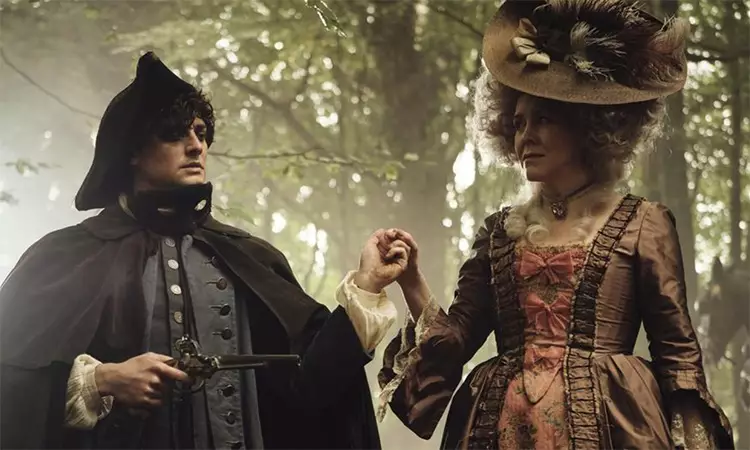In the realm of cinema, narratives that intertwine themes of time travel and romantic folly often find a unique resonance with audiences. Alice Lowe’s film “Timestalker” serves as a fascinating case study of how these themes interplay, creating a rich tapestry of longing, unrequited love, and cyclical existence. As characters traverse through different historical periods—ranging from 1688 to 2117—they continuously grapple with their emotional entanglements, primarily revolving around the tragic character of Agnes. The film not only captures the essence of a journey through time but also lays bare the complexities of human attachment and desire.
At the heart of “Timestalker” lies Agnes, portrayed with poignant vulnerability by Lowe herself. Across the film’s many eras, Agnes is ensnared in a relentless cycle of infatuation with Alex, a character that embodies both allure and danger. This repetitive format mirrors the traditional narrative structures found in Max Ophüls’ “La Ronde,” where love is portrayed as an inescapable trap that leads to heartache and disappointment. Agnes’s obsession with Alex reveals a profound commentary on toxic romance: her unwavering devotion keeps her bound to a series of disastrous relationships, where each rebirth offers no respite from her self-destructive patterns.
In addition to the allure of Alex, Agnes’s neglect of Meg—her loyal maid and confidante—highlights the film’s critique of romantic fixation. Despite Meg’s evident affection and encouragement, Agnes turns her gaze towards figures like George, who embodies a more aggressive form of attraction devoid of genuine connection. This neglect not only exemplifies a grave misunderstanding of love but also casts Meg’s unwavering support as an emblem of unrecognized devotion in the face of romantic delusion.
“Timestalker” further explores the concept of love not merely as a source of joy, but as a catalyst for chaos. Through Agnes’s repeated encounters with various versions of Alex—who simultaneously represents love’s potential and its peril—the film articulates a critique of an overly simplistic understanding of romance. The creators emphasize how love can distort reality, driving individuals to obsession and, in extreme cases, violence. This is exemplified in the visual motif of a “serial killer’s mood board,” a dark homage to random infatuation that renders emotional states hazardous and destabilizing.
Agnes’s fixation on flawed characters serves to deconstruct the romantic genre’s tropes, transforming what is typically celebrated into an examination of destructiveness veiled in passion. Instead of liberation, Agnes’s pursuits result in cycles of despair as she chases after transient connections while ignoring sustainable and meaningful relationships. The film nudges the viewer to consider the psychological ramifications of such toxic attachments and the societal norms that perpetuate them.
Reincarnation in “Timestalker” serves as both a narrative tool and a lens to explore identity. As Agnes reincarnates in different eras, she is forced to confront her cyclical mistakes, often reflected in humorous yet poignant moments as she unwittingly navigates her fate. This exploration of identity is multilayered, suggesting that understanding oneself is a pervasive struggle that transcends time.
Each rebirth gives Agnes fleeting opportunities for clarity, particularly when the true nature of Alex is revealed—no longer a figure of romantic idealism but rather a manifestation of different archetypes, including morally ambiguous roles such as an SS officer or a riot cop. The film adeptly underscores how illusions of love obscure the truth, often leading the enamored astray. As Agnes grapples with the veracity of her feelings, the delineation between love and obsession becomes strikingly blurred.
Ultimately, “Timestalker” encapsulates an intricate commentary on love that invites viewers to re-evaluate traditional notions of romance and happiness. Through its exploration of cyclical patterns, toxic desire, and the myriad ways in which identity unfolds over time, the film serves as a modern reflection on human emotions. As Agnes dances through lives layered with both centuries and heartaches, the narrative transcends mere love stories, dissecting the often dark and convoluted essence of human longing. “Timestalker” emerges not just as a time-travel film, but a profound examination of the struggles that accompany the pursuit of love—making it a uniquely compelling cinematic experience worth engaging with.


Leave a Reply